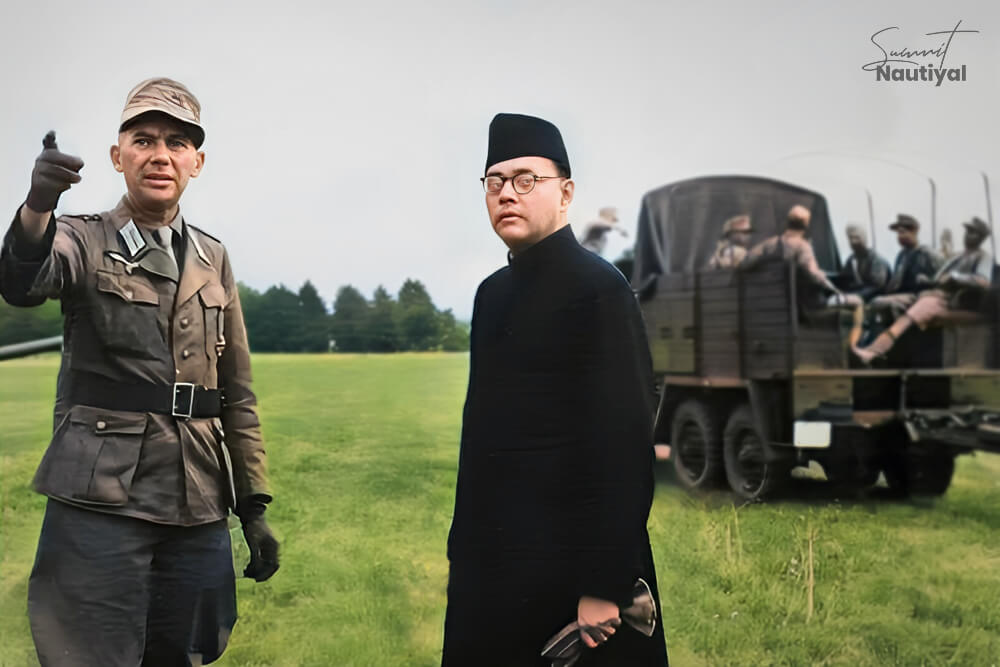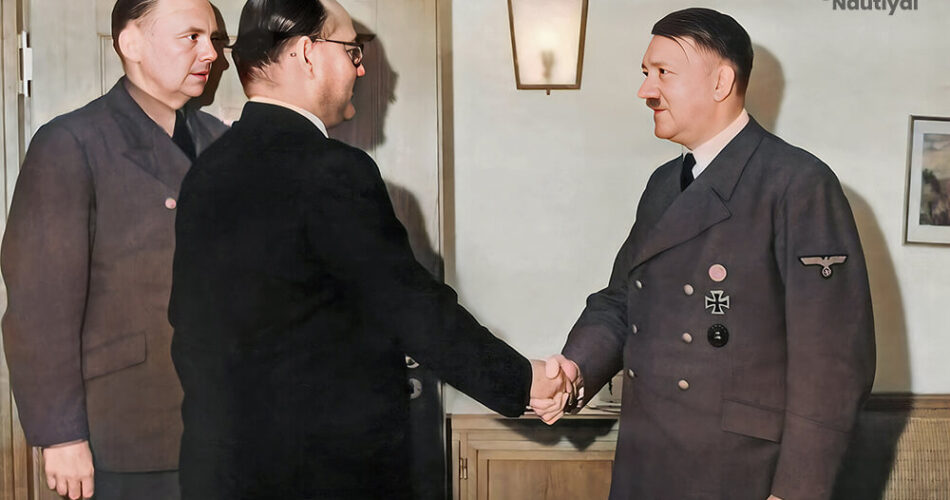Subhas Chandra Bose (1897-1945), also known as ‘Netaji’, served in Germany from 1941 to 1943 with one desire – to free his homeland India from British colonialism.
Germany and India
Bose was motivated to pursue India’s long-cherished objective of independence. At first, he saw Nazi Germany as his enemy. Because during WWII, Germany was different about India. With a plan to organize an ‘Afghan Army’ to attack India, after the collapse of the Soviet Union to steal ‘the jewel of the British Empire’. Germany had a long history of coveting India. Its sympathy and support for India’s quest for independence were flimsy and varied with changing conditions on the war front. During his mysterious ‘Berlin Years’ he remained too hopeful from the Germans for a long time.

Low-key Reception
A low-ranking Foreign Department officer greeted Netaji, when he arrived in Germany in April 1941. His hotel accommodations were comfortable, but he had to wait more than a year to see the Hitler in person. Meanwhile, disputes of conceptions about the Indian situation between Netaji and his German guests were common.
Meeting with the Foreign Ministry
Netaji wanted to form an Indian government-in-exile to declare India’s independence. However, Netaji was unaware that the Germans had their ambitions for India. The Germans were hesitant to discuss any military strategy with Netaji before freeing India. But he did give an opening for German expansionist goals in India. Firstly, people saw Netaji as a refugee leader in Berlin, rather than the leader of the great Indian nation.

The Watershed Moment
Aware of the planned invasion of Russia, Netaji submitted a message to the Germans. He appealed for the preservation of the status quo. Finally he met with German foreign minister J. von Ribbentrop. He informed him that Indian popular opinion was strongly opposed to German fascism and supported the socialist Soviet Union. He pressed for a German proclamation of India’s independence, but Ribbentrop only agreed to study his suggestion. Also, promised to schedule another meeting. Bose was unable to meet with Hitler. He did not receive what he desired from Ribbentrop, but he did not give up hope.
On May 1941, Netaji composed a draught proclamation of India’s independence to the German authorities. Later, someone advised him that it was not the time to publish such a paper. Also suggested that he could establish the ‘Free India Centre’ in Berlin. They granted the centre a ‘loan’ of 10 Million Reichmarks (currency of Germany from 1924-1948). Also, center was approved a monthly allowance of 12,000 Reichmarks for his expenditures. Despite receiving great hospitality, Netaji felt suffocated in Berlin. Because the Germans were monitoring his activities, tapping his phone, and examining his correspondence. He felt confined in an iron cage.

Vacation in Rome
Bose had a six-week vacation in Rome with his newly wedded wife Emilie Schenkl. Also, he met with then-Italian Foreign Minister Galeazzo Ciano. Ciano delivered Netaji to Duce Benito Mussolini, who was a puppet of Germany and incapable of making autonomous decisions. Netaji appealed to Ribbentrop to set up a meeting with Hitler. But the request was denied after Germany attacked Soviet Russia in June, 1941.
He also drew attention to Hitler’s inflammatory remark in his book ‘Mein Kampf’. Hitler in the book stated that he would rather see India under English dominion than any other. Bose urged for its immediate correction. Bose was unable to get Hitler to change his harsh remark. So, in August 1941, Netaji published draught proclamation declaring Germany as India’s enemy. In November 1941, another meeting with Ribbentrop took place, but Ribbentrop refused. He was unable to change Hitler’s remark.
Japan Enters the War
The Japanese declaration of war against the United Kingdom and the United States on December 7, 1941, and the Japanese army’s push towards the Indian border drastically changed the military scenario. He attempted to capitalize on this schism by insisting on the release of his draught proclamation, but German Foreign Minister Ribbentrop wanted to use him for Nazi propaganda and an invasion of the Soviet Union. As astute as he was, knew that he was with the wrong company in Berlin to achieve the proper goal and that history would paint him as an accomplice of the despised Nazi clique. He decided to travel to the Far East to give guidance to the people and prisoners of war of Indian ancestry in South East Asia. In May 1942, the postponement of the release of the draft proclamation on India again disappointed him.

Meeting with Hitler
In June 1942, Hitler and Netaji met at the Reich Chancellery in Berlin. Hitler delivered a lengthy speech on the current state of the world and lectured extensively about the Soviet danger to India. Bose urged Hitler to make a public statement about his position and intentions for India, but Hitler was not interested in extending the conversation.
He predicted that it would take 1-2 years for Germany to expand its influence over India and 100-200 years for India to put her house in order and rebuild to attain Indian unity. He reassured Netaji that if and when German forces reached the Indian boundary, he would be welcomed to step foot on Indian territory in the presence of German liberators to spark ‘the revolution’. It was not a meeting of two national leaders, but rather a tense confrontation between Hitler, the demon-genius, and Netaji, the nationalist titan. Following this episode, Netaji seems to shake off his Hitler delusion.
The Final Departure
The Germans held up Netaji for a year in Berlin, preventing him from leaving for the Far East. Only after the German capitulation in Stalingrad and Hitler’s secret plot for India was he allowed to depart. In February 1943, he boarded a German submarine (U Boat) from Kiel, leaving behind his wife and only child, daughter Anita, as well as many well-wishers in Germany.


Comments